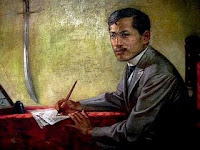Jose Rizal never had Tagalog in mind when he encouraged us to love our own language
 Posted by a certain Chloe Santiago on the Facebook GRP Community Group:
Posted by a certain Chloe Santiago on the Facebook GRP Community Group:
Jose Rizal died in 1896 and Tagalog was declared the official language of the Philippine only in 1937. This can only mean that Rizal wasn't really talking about Tagalog when he made this statement:
"He who does not love his own language is worse than an animal and smelly fish."
Indeed.
Who made the arbitrary directive to make the Tagalog dialect the "National Language" to begin with?
Furthermore, why have a "National Language" when Filipinos are already proficient in the global lingua franca of commerce and scientific achievement?
We fancy ourselves a nation undertaking all efforts to alleviate its citizens' poverty. Yet we have consistently failed to add to the poor's arsenal of employment tools an ability to match the English proficiency of the rich so that, at least in the communication aspect, they will be on equal footing with them. We can only do this by changing our approach to education and the underdog mentality of the poor that motivates them to ridicule English speakers as "pa-sosyal" (i.e. that "them and us" attitude).
It is this divide between the English-proficient elite and the Tagalog-speaking masses that contributes to the increasing polarisation of Philippine society.
Command of English provides instant access to a vast knowledgebase accumulated by the English-speaking world over the last 200 years. It is a knowledgebase to which knowledge is relentlessly being added at an ever increasing rate -- far faster than our Tagalog-articulated knowledgebase is being augmented by both original material and translated material. Considering the English-proficient Philippine elite's mastery over the language of this knowledgebase, it's the old concept of the rich-get-richer-while-the-poor-get-poorer gone ballistic!
Many "cause-oriented" groups trumpet the practicality of the Tagalog language as a key ingredient for progress and nationalism (see a more insight on this here). Yet they fail to provide any solutions to the dearth of knowledge material to lift Philippine society out of its intellectual bankruptcy. Are we going to continue denying the poor basic access to what the elites of Philippine society already monopolise -- a monopoly they use to further their dominance over the dynamism of our society that all Filipinos are entitled to?
Let's not waste valuable classroom time with a language that gets us nowhere. When was the last time you've seen a job ad that read "Tagalog-proficiency will be highly-regarded"? Tagalog is at best a quaint medium for expressing emotion -- something that Filipinos are already world-class at. The objective future, however, is written and expressed in English. Given the whole point of education being an investment in the future and the meager resources of the Philippine Education System, it would be in our best interests to put these resources where they will yield real results.
We need to ask ourselves the very simple question considering we are making a huge investment in our future:
Why Tagalog?




175 Languages and hundreds of dialects.
ReplyDeleteFilipino is a dialect of Tagalog spoken in Metro Manila.
The best way to preserve those languages would have been to have English and Spanish as national languages.
With co-official status for each language in their province. Perhaps get Tagalog speakers to learn Cebuano and encourage people to learn the endangered languages.
Can we consider Cebuano as an endangered "dialect"? when time comes, maybe the cebuano speaking population more popular nationwide and Cebuano dialect can be intelligible to the whole country, then maybe we can consider it to the status of a Language : = Cebuano - a.k.a. (Filipino national language) kaya ang Tagalog.. "dialect" nalang..
DeleteThat sounds like a lot of trouble. Why not just focus entirely on English language instruction across the entire archipelago? More bang for buck there.
ReplyDeletebisayan language should be the national language since there more bisaya in the philippines..
ReplyDeleteTagalog is the rah! rah! rah! of the Ultra-Nationalist deficient in nutrients to feed my noodles, and why would I limit my self? English both written and spoken fills my brain's hunger knowing. I think Tagalog -I see Pinas. I think English -well.... I see The Universe Infinitum.
ReplyDelete@benignO:
ReplyDeleteEasy way out? I keep reading about old Filipino documents written in Spanish, yet our Law students do not have a chance to learn the language.
Effective way to re-write history and our laws. Ensure the people cannot read them.
As if I haven't suggested this 1000x, why not make English the official language -- since it's essentially 'foreign' to everyone, and won't give one national language preference over others -- and preserve the national languages by second language instruction in the areas where they're spoken.
ReplyDeleteGood suggestion there, Ben.
ReplyDeleteHow about a return to Spanish as an official language, benign0? the PH is an ex-Spanish colony after all.
ReplyDeleteI think it's too late for that. English, on the other hand, is widely spoken in the Philippines and is already a medium of instruction and prevalent in media and entertainment.
ReplyDeleteit wouldn't be too late if we start now... its time that Spanish language returns to the Philippines and take up its due place..
ReplyDeleteNo I don't agree with that. In this generation, we don't even understand some "deep" tagalog words or sentences that are used in school (especially in Filipino classes where we study some writings of Rizal) or sometimes in the household. How can we preserve our language by putting English/Spanish as the official languages?
ReplyDeleteAs you have said "English is the medium of instruction (or I should say COMMUNICATION)".
Kindly explain it to me (or enlighten me perhaps).
Please share your insights with me, I just couldn't agree with that easily.
Getting back to Spanish is the only way that Filipinas can regain pride in itself. Spanish WAS and SHOULD be our national language again. Enough "leyenda negra". We´ve taken José Rizal (tks to Americans who needed a martir) as our national hero,,, well,, he wanted Filipinas to continue to be a part of Spain, he loved and wanted Spanish as our national language. I don´t think he´d be very happy with today´s Filipinas. Filipinas was born tks to Spain (otherwise Filipinas wouldn´t exist today)our existence as a nation was written in Spanish, our independence "heroes" spoke Spanish, millions of documents rot in our archives written in Spanish, our culture as a nation is Spanish/latin (fiestas, food, religion, etc) It´s anti-natural that Filipinas opted against. We can´t even read our own history, it´s all written in Spanish.
ReplyDeleteMaybe this is not that late of a comment, but here are some historical facts. The late Senator Sotto, the grand daddy of the current Senator Tito Sotto. Is the father of the Cebuano Language, he even wrote a bill to use Cebuano as the national tongue since it is more widely spoken than Tagalog at that time.
ReplyDeleteGetting some inferiority complex... President Quezon says Tagalog. Why? His opponents where Visayans, like Osmeña and Roxas.
I've been to a lot of places in Mindanao, and what language do they speak, well most of it Cebuano. Gensan and Cotabato... its Cebuano and Ilonggo. Davao a mix of Tagalog, Ilonggo and the majority is... CEBUANO.
But we like English too and we prefer it than speak stupid Tagalog.
Oddly enough, growing up in Cebu, i never felt a polarization due to cebuano and english, and back then, both the lower class and upper class had a good command of both language.
ReplyDeleteI agree with Junji up there that we prefer speaking the english language over tagalog, one of the reasons for that is cebuanos traditionally were bad in tagalog and manileños discriminate us for this and get ridiculed. So much for the 'makabayan language'.
The K-12 with Mother Tongue education and the removal of Filipino as a general curriculum subject in college is a positive step. Filipinos can speak the language of their town/province, preventing the loss of regional languages and preventing animosity between Tagalog speakers and those of other dialects. Further, Tagalog would no longer be imposed on them after high school leaving students more time to study other things. The Mother Tongue education will complement the acquisition of both Filipino, English and other foreign languages. Multilingualism should in fact be encouraged among Filipinos, with their local dialect, Filipino, English and an option of many different languages. This is being done in many European countries, its simply a sign of being progressive. [note how I switch between the word Tagalog and the word Filipino]
ReplyDeleteJust to add to this old thing: Ambeth Ocampo says Rizal never wrote that damned "magmahal sa wika" poem. It was likely by Herminigildo Cruz or Gabriel Beato Francisco.
ReplyDeleteIt just makes so much to sense reintroduce Spanish again, after all it is the mother tongue of Filipinas and the original from the translation of historical documents, cultural and identity.
ReplyDeleteMother tongue of Filipinas? My mother tongue is Cebuano, me and my future child will strongly oppose such reintroduction. Even the Spanish language is a dying language. You must be out of your mind.
DeleteHis portrait is always seen in americana.. the irony.
ReplyDelete